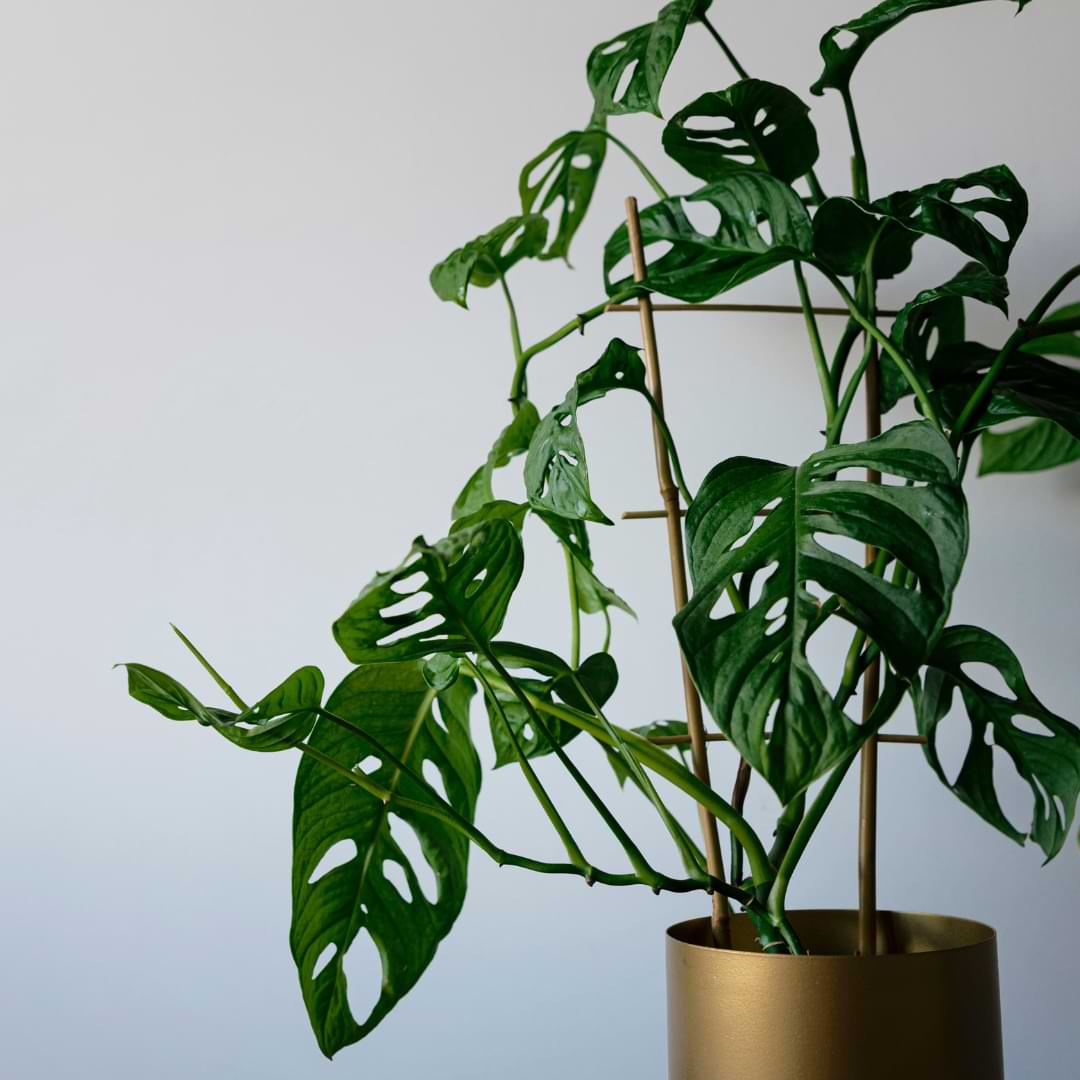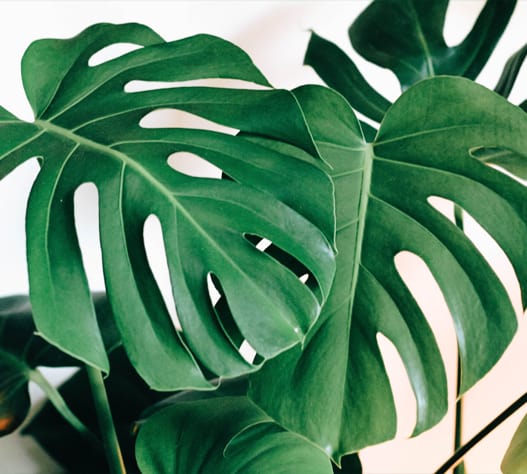For dog lovers who also want houseplants, the question “Are monsteras toxic to dogs?” is a hot topic.
And, unfortunately, the answer is…yes. All monstera species (and most aroids, honestly) are toxic to dogs, cats, and humans.
But just how toxic are monstera plants for dogs? Can you find a way for your monstera and your pup to live in harmony so you can have the best of both worlds?
In this article, we’ll explore what makes monsteras toxic to dogs, as well as steps you can take to help your dogs leave your monstera alone. That way, you can be a pet parent as well as a plant parent without any negative side effects. It is possible for dogs and monsteras to coexist peacefully!
Table of Contents
Why Are Monsteras Dangerous for Dogs?
The good news is that monstera plants aren’t deadly to dogs. If ingested, it will irritate your dog’s mouth, throat, and stomach lining and possibly cause vomiting and drooling. Your pooch’s life won’t be at risk unless it has eaten very large quantities of the plant.
What Are Calcium Oxalate Crystals?
Monstera plants are toxic because the sap of the plant contains calcium oxalate crystals. These tiny particles are made up of oxalate and calcium and are sharp and jagged like a cluster of needles. They can cause irritating micro cuts in tissue in the mouth, throat, and digestive system, or even become embedded in those tissues. These crystals can also bother your skin, which is why it’s a good idea to wear gloves when you prune your monstera.
The crystals are actually helpful to the monstera plant because they prevent it from being eaten by animals. The only part of the plant that is meant to be eaten is the fruit, which is perfectly safe when it’s ripe. This allows the plant to disperse its seeds more widely via animals and their digestive systems.
What Parts Are Harmful?
Calcium oxalate crystals are present wherever the sap flowers, which means it’s in most parts of your monstera, including the stems and leaves, roots, and even the unripe fruit. To sum it up, all parts of the plant are harmful to your dog, which is why it’s best to keep your dog well away from your monstera plants!
Stem
Sap flows through your monstera’s stems and connects the roots to the leaves, so this portion of the plant is full of those calcium oxalate crystals you want to avoid getting on your skin. If you know you’ll be cutting your plant’s stems, be sure to wear gloves!
Leaves
The leaves are also a highly toxic part of your monstera. Don’t let your dog chew on these, and make sure to wear gloves when you prune your plant’s leaves.
Roots
The roots are toxic as well and can harm your dog if it decides to dig in the pot. It’s also a good idea to wear gloves when repotting, dividing, or root pruning your monstera.
Fruit
The fruit of Monstera deliciosa—aka Mexican breadfruit—is not only NOT toxic, but actually edible and quite delicious as long as you eat the fruit when it’s ripe. (Before it’s ripe, though, it can be almost as irritating as the rest of the plant.)
Read more about what to do with Monstera deliciosa fruit here!
Could Monsteras Kill My Dog?
In almost all cases, no.
Ingesting parts of a monstera plant won’t kill a dog unless they are consumed in very large quantities. Large amounts of calcium oxalate crystals in your dog’s body can cause kidney damage, but this is very rare because those crystals will cause pretty immediate irritation, which usually discourages animals from eating more of the plant.
Still, if your dog eats any part of your monstera plant, it’s a good idea to seek veterinary attention right away.
Symptoms of Toxicity in Dogs
If your dog has consumed a part of your monstera plant, you’ll probably notice them pawing at their mouth or face due to oral irritation. You might also see swelling in the mouth, lips, or tongue. In extreme cases, swelling of the throat could make it difficult for your dog to breathe. (If this occurs, get them to a vet ASAP.)
Other warning signs include excessive drooling, vomiting, and loss of appetite.
Treatment
If you think your dog has consumed any part of your monstera plant, call your vet right away, or contact Animal Poison Control at 1-888-426-4436. (Note: This service may charge you for a consultation.)
It’s also a good idea to use clean water to rinse your dog’s mouth, eyes, paws, or any body part that comes in contact with the monstera’s sap. Encourage your dog to drink water to help flush as many of the crystals as possible from the digestive system.
Preventing Your Dog From Eating Your Monstera Plant
So how can you keep your four-legged family members out of your monstera plant?
The best approach is a combination of barriers, training, and deterrents. Here are some tricks to try to keep your pup and your monstera happily separated.
Training
Positive reinforcement can be a useful way to keep your dog away from your plants.
When your dog stays away from the plant, or when they come to you after you call them away from the monstera, reward them with a little treat and a short play session. This teaches your dog to listen to you and that good things happen when they aren’t near the plant.
Distractions
Providing your dog with lots of fun, safe toys, and activities can help keep them occupied so they won’t start nibbling on your plant out of sheer boredom. Try providing a wide variety of chew toys, including some that may require a bit of problem-solving to enjoy. Some toys allow you to hide a treat inside, which can keep your dog entertained for a while as they have to discover how to get the treat out!
You can also try rotating toys to keep things fresh and fun for your pooch.
Finally, make sure your dog gets plenty of play and exercise to manage their energy and keep them stimulated and occupied without having to resort to munching on your monstera.
Deterrents
If training and distraction don’t work (or even as an extra precaution), you can use all-natural deterrents to make your plant less attractive to your dog.
Many of these deterrents make your monstera smell bad to dogs (but totally fine to humans) and can be very effective!
Most pets hate the smell of citrus fruit, so try sticking some lemon, lime, orange, or grapefruit peels in the soil or dabbing a little citrus essential oil on the rim of the pot. You can also try spraying the plant down with water that contains a little lemon juice. Vinegar and citronella can also discourage your dog from messing with your plant, but you may not like the smell either!
Nature’s Miracle also makes a wonderful pet deterrent spray you can spray around the plant to keep your dog away (but avoid spraying it directly on the plant).
Safe Plant Alternatives for Dogs
After all this, you may just decide you don’t want to risk having a dog and a monstera in the same house.
Are there houseplants you can enjoy that won’t harm your pet?
Absolutely! Here are some beautiful and easy-to-care-for plants that are also non-toxic:
- African violet
- Boston fern
- Burro’s tail
- Calathea
- Christmas cactus
- Cast iron plant
- Echevieria
- Haworthia
- Majesty palm
- Money tree
- Nerve plant
- Parlor palm
- Peperomia
- Pilea
- Polka dot plant
- Ponytail palm
- Prayer plant
- Rattlesnake plant
- Spider plants
If you’re concerned about keeping your dog out of your plants but you REALLY want houseplants around, these are all great choices!
Out of Reach
This is one of the best and most reliable ways to keep your dog away from your monstera plant! If possible, put your plant out of reach on a shelf on in a hanging basket (for smaller monstera species). You can also put up a gate, chicken wire, or other barrier to block access to your plant.
Other options include keeping the plant in a room where your dog is not allowed to go.
Also make sure to immediately clear away any dropped leaves so your dog doesn’t think they’re fun new toys and try to play with them!
If you need to keep your dog away from your plants while you’re away, try confining your dog to a monstera-free section of your home or putting them in their crate.
Other Unsafe Plants for Dogs
Unfortunately, there are lots of popular houseplants out there that are unsafe for dogs. Here are some other species to watch out for and leave out of your home if you’re concerned about your fur babies eating them:
- Aloe vera
- Alocasia
- Begonia
- Chinese evergreen
- Dieffenbachia
- Draceana
- English ivy
- Elephant ear
- Fiddle leaf fig and other ficus species
- Inch plant
- Jade plant
- Peace lily
- Pothos
- Philodendron (In fact, it’s best to avoid aroids altogether!)
- Snake plant
- Schefflera
- Zz plant
If you aren’t confident you can keep your dog away from your houseplants, be sure to avoid these varieties!
FAQ: Are Monsteras Toxic to Dogs?
FAQ: Are monsteras toxic to humans?
Yup! Monstera plants are just as toxic to humans as they are to dogs, for the exact same reasons. Those calcium oxalate crystals can irritate our skin, eyes, mouth, and digestive tract, so it’s important to avoid getting the sap anywhere you don’t want it by wearing gloves when you prune or otherwise cut your monstera. Also, be sure to keep curious children away from your monstera plant!
FAQ: Can a monstera plant recover from being eaten?
Once you’ve taken care of your dog who just took a bite out of your monstera…what about the plant?
Unfortunately, when your monstera is injured and gets tears or holes in its leaves (not the natural fenestrations, but the damaging ones caused by an accident or assault from your dog), it won’t recover. The leaves won’t heal. Your best bet is to prune heavily damaged leaves so the plant can redirect its energy toward growing new ones.
FAQ: Are monstera plants toxic to cats?
They sure are. These plants are toxic and irritating to just about every creature, so it’s best to keep all humans and animals well away from the sap just to be safe.
Monsteras and Dogs: NOT a Match Made in Heaven
Monsteras are beautiful houseplants that so many of us love, but they don’t mix well with our furry friends!
Try these tips to help your dog and your monstera coexist. If you just can’t make it work, there are plenty of other non-toxic houseplant options out there to enjoy while keeping your pet safe!
For more monstera resources, be sure to check out our helpful community on Facebook!





